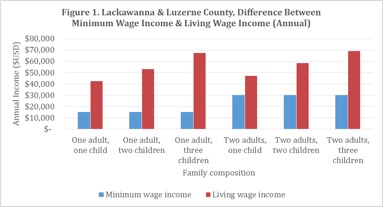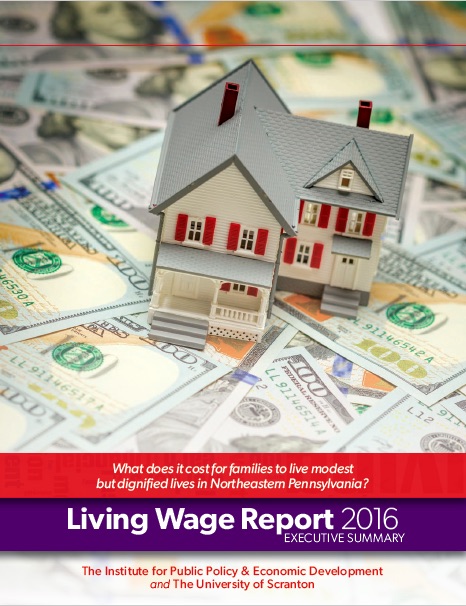Living Wage Report

Families in Northeastern Pennsylvania confront severe economic challenges, including elevated levels of unemployment and extreme poverty. While there are many families that fall below the “official” measure of poverty — the federal poverty line — there are also many who work full-time but earn less than a living wage. Individuals and families lack economic security in both cases; but the latter find themselves in an ambiguous situation, which this report seeks to clarify.
To be classified as economically secure, a household must earn wages that allow its members to meet their “essential basic needs and live a modest but dignified life.” The living-wage threshold represents the amount of income required to achieve this standard of living.
This living wage study was prepared by the Institute for Public Policy & Economic Development in partnership with Education for Justice and the Office of Community & Government Relations at The University of Scranton, and with additional collaboration from Campus Ministries’ Center for Service and Social Justice and the Department of Communication.
Page Contents:
Executive Summary
Community Leader Profiles
Report Recommendations
Reflection Questions
In the News: Faculty Snapshots, Event Coverage & Background

Community Leader Profiles: The Work of Scranton Area Social Service Agency Directors & How the Lack of a “Living Wage” Affects Their Clients
Completed by students in Communication 224: News Writing taught by Dr. Kim Pavlick, Assistant Professor. Department of Communication.
-
Scranton Man Helps Community To Achieve Dignified Life by Robert Bauer, Class of 2017
-
United Neighborhood Center CEO Helps Thousands by Steven DePrimo, Class of 2018
-
Called to Help Others by Dan Valentino, Class of 2017
-
Scranton Sister Works with Those in Need by Shannon Bowen, Class of 2018
-
Serving One Meal, and Smile at a Time by Emily Darcy, Class of 2017
-
Jesse Ergott: Helping Homeowners, One Home at a Time by Jeffrey Paine, Class of 2018
-
St. Joseph’s Center’s President: Steward of Service by Nick Wasnetsky, Class of 2017
Challenging Stereotypes: Student Reflections and Critical Analysis of Stereotypes of “the poor”
Completed by students in PSYC 364: Psychology of Diversity taught by Dr. Jessica Nolan, Associate Professor, Department of Psychology.
- The Poor are Uneducated? by Shelby Karboski, Class of 2017
- The Poor are Depressed Alcoholics? by Christie Civil, Class of 2017
- The Poor are Lazy? by Melissa Lopez, Class of 2017
Recommendations
To achieve family economic security, a multi-pronged approach is required that involves economic and workforce development, government social safety net programs, and private charitable activities. The following recommendations reflect conclusions drawn from the data presented in this report and based on the advocacy efforts and policy positions of Catholic Charities USA and the U.S. Conference of Catholic Bishops' Poverty USA Initiative, illustrating the rich discussion of poverty, just wages, and economic justice present in Catholic Social Teaching.
To learn how you can take action in support of policies that promote a "living wage", please visit the Advocacy Corner.
View a letter from Bishop Bambera of the Diocese of Scranton
Reflection Questions
In the News & Event Highlights
- Faculty Snapshot Op-eds:
- Dr. Will Cohen: "Living wage as matter of basic human dignity"
- Dr. Meghan Ashlin Rich: "Living wage critical to city’s revitalization"
- Dr. Jessica Nolan: "Kernels of truth yield bushels of stereotypes"
- Dr. Michael J. Jenkins and Dr. Ismail Onat: "Offset Crime's Impact on Disadvantaged"
- Dr. Linda Ledford Miller: "Melting Pot Stew's Language"
- Coverage of Living Wage Report and Events
- The Scranton Times-Tribune, Jon O'Connell: "Local income disparity widens"
- The Scranton Times-Tribune, Denise Allabaugh: "Governor proposes raising the minimum wage to $12 per hour"
- The Scranton Times-Tribune Op-ed, Kevin Quinn, S.J.: "Need for Living Wage Tests Community's Resolve"
- The Aquinas: "Living Wage Study Shows Poverty in Lackawanna County"
- Ignation Solidarity Network: "University of Scranton 'Living Wage' Study Reveals Lingering Income, Job and Social Service Challenges in N.E. Pennsylvania"
- Times Leader: "What is a 'living wage' in Luzerne and Lackawanna counties"
- Scranton Times Tribune: "Study: wages in region fall short of state average"
